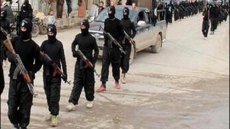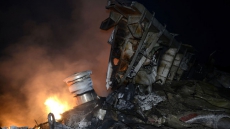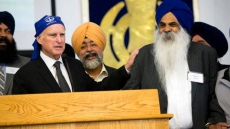BRUSSELS — walked through NATO's doors Tuesday suggesting he won't have to do much of a sales job over the impending withdrawal of Canada's jets from the U.S.-led bombing campaign against militants in Iraq and Syria.
Other countries, including North Atlantic allies, understand the warplanes have played only a small part in the effort, and that Canada will be more effective in a training role, Dion said on his way into a meeting of foreign ministers.
"There are a lot of things where Canada may be a great supporter, instead of delivering two per cent of the airstrikes," the global affairs minister said.
Dion also indicated the signals he and Prime Minister Justin Trudeau have received at other international conferences is that Canada's new policy is "well understood."
It remains unclear when the jets will be coming home — or what a beefed-up training commitment would look like — but Dion could see a menu of opportunities before him during the two-day ministerial meeting.
The war against the Islamic State of Iraq and the Levant, also known as ISIL or ISIS, is not a NATO mission, but almost all members contribute in one form or another to the U.S. coalition.
The alliance announced last summer it was embarking on a "capacity-building" training program for the Iraqi military, but gave no timelines for the training at sites in Turkey and Jordan. It was looking at a wide series of measures, including countering improvised explosive devices, bomb disposal, de-mining, civil-military planning, cyberdefence, military medicine and medical assistance.
How far along the plans might be and whether the contingents are fully staffed is uncertain, but what is clear is that the Trudeau government is more prepared to embrace the alliance initiatives than the Harper government had been over the last few years.
Under the Conservatives, Canada was pulled more tightly into a U.S. orbit with a series of policy changes and agreements, and was more willing to act in ad-hoc coalitions, like the one bombing ISIL.
"Canada will be a positive partner," Dion said. "We want to re-engage Canada in multilateralism and NATO is at the core of that."
The alliance conducted a military training mission in Iraq, but it was shut down when the U.S. withdrew its forces in 2011.
The reconstituted undertaking bears a passing resemblance to what NATO has been doing in Afghanistan with some success — a mission that included nearly 900 Canadians for three years. Afghan forces, despite taking a pounding from a renewed insurgency, have largely held their ground, whereas Iraqi forces melted away in the face of last year's ISIL onslaught.
NATO's future role in Afghanistan and how to fund the country's fledgling security forces was up for debate Tuesday among foreign ministers.
"Afghan forces have faced great challenges but they have shown tremendous courage and determination," said NATO secretary general Jens Stoltenberg.
"This has been a year of challenges, but it also been a year of progress.... Supporting a stable Afghanistan is in the interest of our own security."
The ministers will approve a continued deployment of roughly 12,000 trainers and advisers to mirror a recent U.S. decision to extend its presence in the war-torn country past 2016. Canada no longer has training troops in Afghanistan.
They were also asked to approve a plan to raise $4 billion per year from the international community to fund Afghan security forces up to 2020. Stoltenberg said the matter will be discussed when leaders meet in Warsaw next year, and he declined to provide a provide a specific figure after the meeting.
Donor countries began paying the bills for Afghan troops and police following the 2012 NATO summit in Chicago. The Harper government made a $330 million commitment up to 2017.
Despite a nearly decade-long NATO combat mission, which included the deaths of 158 Canadian soldiers, the Taliban and other extremist groups remain a persistent and lethal threat in Afghanistan — something that was evident a few weeks ago when the northern city of Kunduz fell to insurgents.
It was eventually recaptured by Afghan forces with the help of U.S. air support, but it raised fresh questions about the readiness of local forces to carry on the fight without western help.
The Obama administration recently reversed a plan to entirely withdraw American forces. On Monday, Doug Lute, the U.S. ambassador to NATO, underlined that Washington expects allies to match the commitment to keep 10,000 troops in the country through next year.
A senior NATO official, speaking on background Tuesday, said the alliance's mission in Afghanistan is strictly an advisory and training commitment and that no one anticipates a return to a combat mission.
The official described the effort to secure the initial round of commitments as "a demanding ask" for western countries that were still limping out of the global financial collapse.
The upcoming request could also be challenging, said the official, who wasn't authorized to discuss the matter publicly.
"I hesitate to say whether in 2011 the global financial situation was more or less difficult than now, but we will again have to make the case for the connection between the security of Afghanistan and our own security.
"We will be making that argument in the coming months."




